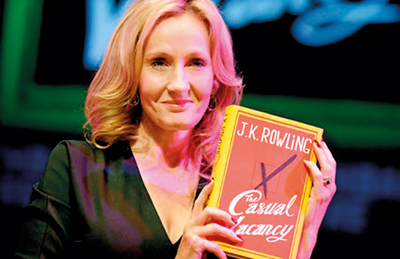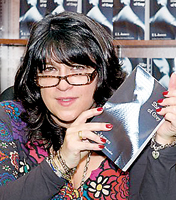Rowling on a vitriolic roll
Is it just me or does the name Pagford conjure up a quaint, pretty town a few kilometres away from Hogwarts? Doesn’t Barry Fairweather sound like the perfect name for a kindly but bumbling wizard? Alas, in The Casual Vacancy, J.K Rowling’s much anticipated book for adults, there isn’t a single happy child in Pagford and Barry, who is the only character you’ll find easy to like, is dead by page 5. In fact, even adult readers will need to brace themselves. Rowling’s novel seems to be fuelled by many years’ worth of stored up profanity, vitriol and despair, all channelled into a book that is unrelentingly, depressingly, slit-your-wrists-by-page-50 bleak.

Pagford might look like an idyllic little town, but behind its picturesque little cottages with their baskets of hanging flowers, lies a hotbed of political manoeuvring, marital discord, sexual frustration, thinly disguised racism and snobbery, all of which erupt when Barry’s passing leaves a casual vacancy on the parish council.
As a child growing up in the poor community housing project known as the Fields, Barry is a success story. He used to be the most powerful opponent of the plan to offload the Fields and its drug addiction treatment clinic onto the adjoining city of Yarvil. Now that’s he’s gone, the old guard, led by the disgustingly obese Howard Mollison, think they have a chance to clean up Pagford.
As jockeying for Barry’s seat begins, a series of mysterious messages are posted by ‘the Ghost of Barry Fairbrother’ on the council website – defamatory but unnervingly accurate, they begin to knock off the competition until no one is left standing. A reader could be forgiven for wondering if there was a vice Rowling did not determinedly pack into her novel.
Cyber hacking, robbery, schoolyard bullying and racism serve almost as light relief in comparison to the novel’s weightier obsessions: rape, heroin addiction, crushing poverty, sexual abuse, incest and domestic violence. The line about the ‘miraculously unguarded vagina’ is already legend, but add in the sex scene in the cemetery, the descriptions of teenagers surfing the web for porn (their finds presented in unflinching detail), the drug dealer turned rapist, the elderly woman fantasising about a teenage heartthrob and you have more characters obsessed with sex than you’d find in 50 Shades of Grey. To top it all off, Rowling is fond of similes like the now infamous description of a used condom: “glistening in the grass beside her feet, like the gossamer cocoon of some huge grub.”
When an interviewer from The New Yorker asked Rowling if there might be strong objections to the idea of young Harry Potter readers being drawn into such material, she responded: “There is no part of me that feels that I represented myself as your children’s babysitter or their teacher… I’m a writer and I will write what I want to write.” Her fans are clearly willing to take Rowling on her terms – more than a million pre-orders were placed for The Casual Vacancy but the book has received mixed reviews: one critic lamented the vacancy at the heart of the novel, another said it was worthy of a nomination for the Booker Prize.
The truth is that the book has its moments.
Rowling reportedly drew on her own experiences of small town life to create Pagford. Authentic or not, her take is definitely skewed. Populated with horrid Muggles built along the model of the Dursley family (without any wizard around to put the fear of god into Vernon), the adults in the novel are almost uniformly petty minded and tedious and have little to recommend them. Though they’re nothing like the unbelievably well behaved Potter, Rowling’s teenagers are the real deal – angsty and self-righteous, high on hormones, marijuana and their contempt for the technologically challenged adults around them, they are nevertheless desperately vulnerable. If there is a saving grace, it is that Rowling gives these underage protagonists real depth, none more so than the character of Krystal Wheedon.
Barry’s protégé used to be the girl who allowed the boys to grope her in the back of class, and she’s still easy with her favours, but Rowling forms and reforms the sexually precocious teenager so that we see her shift from a schoolyard bully to a young athlete singing along to Rihanna to a sister fiercely determined to protect her baby brother. Krystal’s passage through the school is compared to that of a ‘goat through the body of a boa constrictor, being highly visible and uncomfortable for both parties concerned’ and when the system fails her, you know it’s because she never really had a chance anyway.
Andrew’s father Simon calls him ‘Pizza Face’ – a reference to the acne that pimples his skin. Rowling’s description of a family living in fear of a man’s fists is harrowing and your sympathy for the boy is undiluted. Sukhvinder has made an art of lying low. The daughter of Sikh immigrants, she is teased as ‘mustachioed yet large-mammaried’ and dubbed ‘the Great Hermaphrodite’ and a ‘hairy man-woman’ by cruel classmates (the descriptions have led members among the Sikh community in India to lobby for the banning of the book). When her tormentor Fats is not ridiculing her, he is channelling all the rage and sorrow boiling inside him at his hapless parents. Looking at him, his mother Tessa thinks: ‘How awful it was…remembering Fats the toddler, the way tiny ghosts of your living children haunted your heart; they could never know, and would hate it if they did, how their growing was a constant bereavement.’
It is moments like that amid all the grimness and despair that salvage ‘The Casual Vacancy’ for the reader, even if Rowling ruins it all by dragging us into a furious melodrama that masquerades as an ending. There is no meaning and no hope, and the Rowling who killed Dumbledore has clearly triumphed over the Rowling that spared Harry.
She is bristling with the F-word and wrung out on tragic deaths of children. Her fans may be left suppressing the urge to mutter ‘reparo’ – but what’s broken in The Casual Vacancy cannot be repaired for Rowling cannot forgive the Muggles for what they have made of the world.
The Casual Vacancy priced at Rs. 2,750 is available in local bookstores.
Follow @timesonlinelk
comments powered by Disqus






















